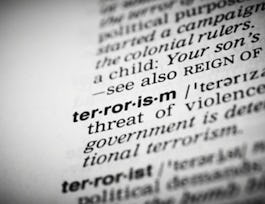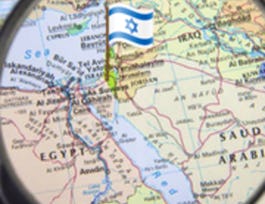This course will explore the forces that led to the 9/11 attacks and the policies the United States adopted in response. We will examine the phenomenon of modern terrorism, the development of the al Qai'da ideology, and the process by which individuals radicalize towards violence.


Understanding 9/11: Why 9/11 Happened & How Terrorism Affects Our World Today
Taught in English
Some content may not be translated
12,108 already enrolled
(116 reviews)
Details to know

Add to your LinkedIn profile
See how employees at top companies are mastering in-demand skills


Earn a career certificate
Add this credential to your LinkedIn profile, resume, or CV
Share it on social media and in your performance review

There are 7 modules in this course
In this course, we will examine why al Qai-da attacked America. We will also examine the phenomenon of terrorism, in general, and the radical ideology developed and propagated by Osama bin Laden through al Qaida, more specifically. We will consider why individuals are attracted to this ideology and how they radicalize to violence. We will also explore how the United States addressed terrorism prior to 9/11 and the policy changes the US (and its allies around the globe) faced in the immediate aftermath of the attacks.
What's included
3 videos4 readings
Our topic for this week is, what is terrorism. We will try to define terrorism and understand the actions that we're going to be studying in this course, 9/11 and its aftermath. We will examine one of the key debates in this area; can terrorism be executed by a state, or is it only the use of political violence by a non-state actor. You will also learn how to write a policy memo.
What's included
8 videos1 reading
This week we have a special treat: we will have an extensive conversation with Imam Abdullah Antepli, the Islamic Chaplin here at Duke. We’ll cover a wide range of topics, including Islamic history, law, the role of women and the Muslim experience in the post – 9/11 world.
What's included
13 videos1 reading
Our topic for this week is the al Qaeda ideology. An ideology is essentially the set of beliefs that an individual, a group, or an organization has to either motivate them or to give that organization purpose. For al Qaeda, of course this is incredibly important because they're trying to motivate individuals to sacrifice their lives for what they view as a great cause.
What's included
9 videos1 reading
This week we’ll examine how individuals become radicalized. We’ll see that there are multiple paths to radicalization where opportunity and chance play a significant role. Thus, radicalization is a complex process that defies simple explanation. We’ll conclude with a conversation with Peter Neumann, Professor of Security Studies at the Department of War Studies, King’s College London, and director of the International Centre for the Study of Radicalization.
What's included
6 videos1 reading1 peer review
This week we’ll examine the three main US political philosophies that underlie the country’s approach to counterterrorism. We’ll look at the beginnings of the US response to this growing threat and how US agencies involved in counterterrorism efforts have adapted over time. Finally, we’ll examine how the US attempted to combat Osama bin Laden’s growing threat to US security.
What's included
8 videos1 reading
In this final week of the course we’ll speak with Juan Zarate , one of the key White House counter terrorism advisers in the second Bush administration, about US counterterrorism efforts since 9/11. We’ll look at the current state of threats to US interests from emerging actors, such as ISIS. Finally, we’ll look at the recent developments in the Middle East that affect US security.
What's included
8 videos1 reading1 peer review
Instructor

Offered by
Recommended if you're interested in Governance and Society

Universiteit Leiden

University of North Texas

Johns Hopkins University
Why people choose Coursera for their career




Learner reviews
Showing 3 of 116
116 reviews
- 5 stars
75%
- 4 stars
17.24%
- 3 stars
6.03%
- 2 stars
1.72%
- 1 star
0%

Open new doors with Coursera Plus
Unlimited access to 7,000+ world-class courses, hands-on projects, and job-ready certificate programs - all included in your subscription
Advance your career with an online degree
Earn a degree from world-class universities - 100% online
Join over 3,400 global companies that choose Coursera for Business
Upskill your employees to excel in the digital economy
Frequently asked questions
No. Completion of a Coursera course does not earn you academic credit from Duke; therefore, Duke is not able to provide you with a university transcript. However, your electronic Certificate will be added to your Accomplishments page - from there, you can print your Certificate or add it to your LinkedIn profile.
Access to lectures and assignments depends on your type of enrollment. If you take a course in audit mode, you will be able to see most course materials for free. To access graded assignments and to earn a Certificate, you will need to purchase the Certificate experience, during or after your audit. If you don't see the audit option:
The course may not offer an audit option. You can try a Free Trial instead, or apply for Financial Aid.
The course may offer 'Full Course, No Certificate' instead. This option lets you see all course materials, submit required assessments, and get a final grade. This also means that you will not be able to purchase a Certificate experience.
When you purchase a Certificate you get access to all course materials, including graded assignments. Upon completing the course, your electronic Certificate will be added to your Accomplishments page - from there, you can print your Certificate or add it to your LinkedIn profile. If you only want to read and view the course content, you can audit the course for free.



